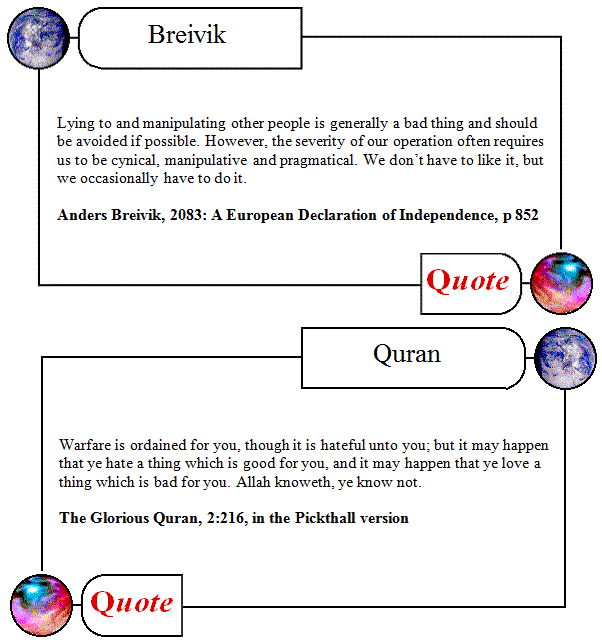Why [still] bother with Breivik?
Friday, August 5th, 2011[ by Charles Cameron — popular opinion, informed decision-making, journalism and analysis in reference to Oslo / Utoya ]
.
At least two regulars here on ZP, Cheryl Rofer and Joey, have wondered whether it’s even worth bothering to track Anders Breivik’s thought — fifteen hundred pages of cut and paste from all across the web, interspersed with page after page of his own musings.
Joey wrote, “I’m not sure this guy deserves the kind of close analysis he is getting” — and Cheryl:
I’m not at all sure that examining his “writings” tells us much beyond that these themes have been pulled into a particular orbit of hating. What might be interesting is why those themes have been found so suitable for that purpose.
I believe that tracking Breivik’s thought processes are important for two main reasons, and for two main audiences: the general public (and by extension the journalists who inform them), and policy makers, military and civilian (and thus also the intel analysts who brief them).
1: media and public
It’s important for the general public not to be left with the wrong impression, specifically as regards who or what is to blame — so that the events in Oslo do not contribute to a further deterioration in public debate.
There are a number of ongoing public conversations around Islam, Islamophobia, Christianity, the clash of cultures, the “socialist” left or “fascist” right, the media, the internet, the pernicious effect of gaming, etc., where it’s not just useful but necessary to establish some clarity on what can and cannot fairly be said about Brevik — who he was, who influenced him, who ignored him, who publicized him, who he really hated, whether he was simply mad, and above all, whose fault “it” was.
And as always the truth is more nuanced than black and white – so that in all this morass of claims and counterclaims, there are slippery slopes to be avoided, and significant distinctions to be drawn..
2: analysts and policy makers
There are also a number of areas of intel analysis where his writings may provide significant leads, and where intelligent intelligence (forgive the play on worlds) is at a premium.
As an example, I have suggested that just as it’s important to know the history of the far enemy and global jihad concepts in studying contemporary jihadism, it would be helpful to know if Breivik’s manifesto is the first place where Hindutva and Odinist and militant Christian and Masonic strands have been brought together in what I can only call an “ecumenical” manner.
I’ve no doubt some of this is of importance to those whose job it is to prosecute or defend Breivik himself: but it’s the significance Breivik has as a marker of otherwise barely detected currents of thought — “undertows” in my personal shorthand — and of the fact that such currents can now easily connect across the net to create an increased complexity of the unexpected, that most concerns me.
*
By now, most of the specific groups and individuals mentioned by Breivik have been identified, and those with specific interest in them have taken note: thus the Indian press has reported on his interest in Hindutva and quotations from Sita Ram Goel, both the UN-recognized “International Templar Order” and his own Masonic order have disowned him, and so on – so there’s no point in my posting separate comments on the role of the Hindutva movement in his thinking, nor of his fascination with the Templars and their symbolic presence in other places of interest such as Joseph Di Mambro and Luc Jouret‘s Order of the Solar Temple (locus of mass suicides/murders in France, Switzlerland and Quebec, 1994), or more recently the Michoacan La Familia cartel offshoot Los Templarios – a link which John Robb was one of the first to make…
Mexico, not Norway…
I will, however, post two more roundups of articles: one of pieces that strike me as outliers from the usual media coverage, touching on some of these specifics, the other noting the most thoughtful and informed coverage I have seen from scholars of religion.
I offer these as resources for those who have good reason for continuing interest in Breivik, in the hope that they may turn up some data points that are illuminating when connected — but also to help correct some of the erroneous linkages that have already been made.
*
I am also hoping to make a post here shortly on Romanticism and the significance of myths, rituals and dreams — focusing mainly on the recent Requiem and obsequies for Otto von Habsburg, but with, I suspect, relevance to a strong romantic streak in Breivik, too…







